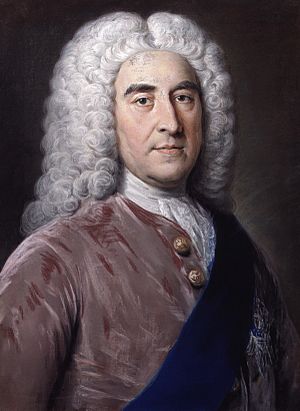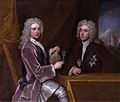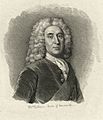Thomas Pelham-Holles, 1st Duke of Newcastle-upon-Tyne facts for kids
Quick facts for kids
His Grace The Duke of Newcastle
|
|
|---|---|
 |
|
| Prime Minister of Great Britain | |
| In office 16 March 1754 – 16 November 1756 2 July 1757–26 May 1762 |
|
| Preceded by | Henry Pelham The Duke of Devonshire |
| Succeeded by | The Duke of Devonshire The Earl of Bute |
| Personal details | |
| Born | 21 July 1693 |
| Died | 17 November 1768 (aged 75) |
| Political party | n/a (Whig) |
Thomas Pelham-Holles, known as the 1st Duke of Newcastle, was an important British politician. He was a member of the Whig group, which was a major political party in Britain at the time. He served as the Prime Minister of Great Britain not once, but twice! He was born on July 21, 1693, and passed away on November 17, 1768.
Contents
Who Was the Duke of Newcastle?
Thomas Pelham-Holles was a very powerful figure in British politics during the 1700s. He came from a wealthy and influential family. His long career in government helped shape Great Britain for many years. He was known for his hard work and for being very good at managing political groups.
Early Life and Political Start
Born in London, Thomas Pelham-Holles inherited a lot of money and land when he was young. This wealth helped him become involved in politics early on. He joined the Whig Party, which believed in a strong Parliament and limited power for the King. He quickly became an important person in the government. He was good at making alliances and getting people to work together.
Becoming Prime Minister
The Duke of Newcastle served as Prime Minister of Great Britain two separate times. The Prime Minister is the head of the government, similar to a president in some countries. This person leads the country and makes important decisions.
First Time as Leader
His first time as Prime Minister was from 1754 to 1756. During this period, he worked closely with King George II. Even though they didn't always agree at first, they learned to work well together. Newcastle was very focused on foreign policy, which means how Britain dealt with other countries. He tried to keep peace in Europe, especially by supporting Austria.
Working with William Pitt
After a short break, he became Prime Minister again in 1757. This time, he formed a partnership with William Pitt. Pitt was a very popular speaker and leader, especially during wartime. Newcastle was great at managing the government and its finances, while Pitt focused on military strategies. Together, they led Britain through the Seven Years' War, a big global conflict. The year 1759 was especially successful for Britain, with many victories, and it became known as the 'Annus Mirablis' (Year of Miracles).
Later Years and Legacy
The Duke of Newcastle retired from being Prime Minister in 1762. He continued to be an important voice in politics for a few more years. He spent his final years at his beautiful country home, Claremont, which he loved very much. He died in 1768, leaving behind a legacy as one of Britain's longest-serving and most influential politicians of his time.
Images for kids
-
King George II who reigned from 1727 to 1760. Despite their initial violent hatred of each other, he and Newcastle grew to have a very productive relationship which lasted for over three decades.
-
Newcastle spent much of his last few years at Claremont. He was exceptionally proud of the house and its extensive gardens on which he had spent a fortune.
-
Newcastle (left) and Henry Clinton, 7th Earl of Lincoln as painted by Godfrey Kneller, ca. 1721.
-
Newcastle in 1735 when he was Southern Secretary in the Walpole Government
-
Newcastle was a strong supporter of Austria, and advocated aid to the country during the War of the Austrian Succession. After the war he built his system for retaining peace around the alliance with Austria, only for it to collapse spectacularly in 1756.
-
Henry Fox, 1st Baron Holland, by John Giles Eccardt, after Jean Baptiste van Loo, ca. 1740
-
William Pitt was the leader of the Patriot Whigs, and a constant thorn in Newcastle's side. Many were surprised when the two formed an electoral partnership in 1757.
-
1759 became known as the 'Annus Mirablis' after Britain enjoyed victories on several continents as well as at sea. In November a French fleet planning to invade England was defeated at Quiberon. Much of the credit went to Pitt rather than Newcastle
See also
 In Spanish: Thomas Pelham-Holles para niños
In Spanish: Thomas Pelham-Holles para niños
 | Valerie Thomas |
 | Frederick McKinley Jones |
 | George Edward Alcorn Jr. |
 | Thomas Mensah |











